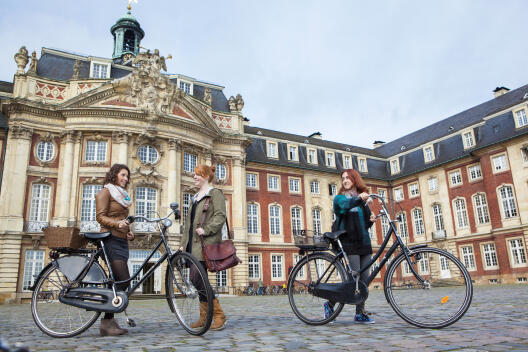
The University of Münster is one of the largest institutions of higher education in Germany. Our 15 faculties offer more than 270 degree programmes and numerous advanced qualification opportunities in cooperation with cross-faculty departments. Ours is a dynamic academic environment, shaped by students and instructors from Germany and around the world.
Those who study, research, teach or take up employment here become part of an open-minded university community, dedicated to offering high-quality study and instruction. We are committed to offering an excellent higher education at the University of Münster. The following mission statement on teaching and studies reflects the self-image of our institution and serves to provide orientation.
University as a place of scientific and academic interaction
We, the members of the University of Münster, view our institution as a social environment where we study, work, discuss and collaborate for the purpose of learning and research. We are united in our scientific curiosity, an interest in academic discourse and a commitment to transferring science-based findings in myriad contexts.
The interplay of research, teaching and transfer constantly challenges us to reassess the validity of our methods and knowledge and to venture in new directions. To answer our questions, we consider the diversity of academic perspectives and interdisciplinary approaches. We examine various perspectives in a critical and open-minded manner and act according to the principles of the academic community: recognition and understanding, rules-oriented analysis, critical thinking and clear and precise communication of scientific considerations. We regard our faculties, academic institutions and research partnerships as vibrant locations of scientific interaction which give rise to a diverse array of teaching and learning processes.
Because recognition, comprehension, knowledge and thought occur in a globally interconnected academic community, we seek international exchange and promote mobility in the context of teaching and studies. We value the diversity of backgrounds and nationalities and promote peaceful communication between social, cultural, religious and ethnic communities at our university. In this way, the University of Münster is a place of common learning where barriers are surmounted, and new knowledge is created.
Taking action in a permanently changing world
We are all aware of our dynamically changing world, of dwindling planetary resources, of hunger, violence, suffering and injustice. We see it as our task to reflect academically on the fundamental circumstances and multiple changes which are impacting the individual, society and the environment, as well as research and teaching. In view of these challenges, building transformative competence for taking action is an important objective. To this end, we must address these challenges by acquiring knowledge by means of critical analysis of complex realities and experience-based examination.
We also recognise that fundamental crises are driving uncertainty, superficiality and polarisation to an ever-increasing degree. To counter disinformation and hostility toward science, we strive to engage in empathetic, multiperspective debate and introduce factual information and potential solutions to public discourse in an understandable way, e.g. by offering alternative models and theories. We see teaching and studies as domains where we can jointly develop the necessary skills for taking such action.
Cooperative responsibility for academic teaching-learning processes
We assume mutual and cooperative responsibility to ensure the success of studying and teaching, to develop diverse skills and to promote education. We understand that our time at university is a chance to actively shape our own educational background. We are aware that there are many different motivations and personal goals that are closely tied to teaching and studies. We reflect on our motives and openly express our individual interest in knowledge.
We regard teaching and studies as fields where interpretation and understandable communication of complex matters are of particular importance. By productively making use of discrepancies in knowledge and experience and mutually considering each other’s questions, we build an open, inclusive and inspiring relationship to one another. We see diversity and equal opportunity as assets and diversity as a chance for excellent education and innovation.
Our future-oriented teaching-learning concepts comprise various target dimensions of study – personality development, academic (and artistic) aptitude, professional qualification and responsible social participation – which engenders a productive form of interaction. We jointly reflect on and enhance the quality and attractiveness of our degree programmes and consider the feedback of internal and external experts, as well as that of our graduates. Together we build a supportive network that extends beyond the phase of study and instruction.
